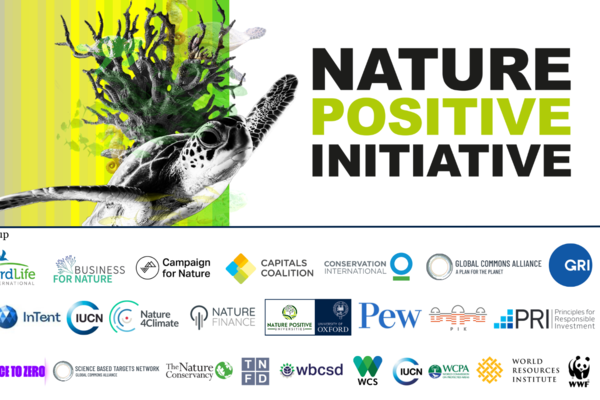Nature Positive Initiative launches to support and promote the Global Goal for Nature
Nature Positive Universities and the University of Oxford are core partners in this new international initiative
Nature positive by 2030 is an ambitious global goal for nature, equivalent to the 1.5°C goal for climate. The aim is to halt and reverse biodiversity loss by 2030 from a 2020 baseline, through measurable gains in the health, abundance, diversity, and resilience of species, ecosystems, and natural processes.
Today, the new Nature Positive Initiative launches, a collaboration between 27* of the world’s largest nature conservation organisations, indigenous forums, institutes, and business and finance coalitions – including Nature Positive Universities and the University of Oxford. The Initiative will drive alignment around the definition, integrity, and use of the term ‘nature positive’, plus support broader, longer-term efforts to deliver nature-positive outcomes.
Nature Positive Initiative
Governments, business, and civil society have rallied behind the optimistic and practical nature-positive ambition since work on it started in 2019. Calls for action have only grown stronger, with reversing biodiversity loss recognised as critical to limiting global warming to 1.5°C, reducing humanity’s vulnerability to pandemics, water, and food insecurity, and supporting sustainable and equitable development. In December 2022, the goal of halting and reversing biodiversity loss by 2030 was codified in the mission of the landmark Kunming-Montreal Global Biodiversity Framework. Its adoption under the UN Convention on Biological Diversity has been described as the ‘Paris moment’ for nature.
At the same time, use of the term 'nature positive' has grown without a clear and aligned understanding among business, finance, government, and civil society actors about what the phrase represents – and what it does not. Making this clear and preserving the integrity of the definition as a measurable 2030 goal is now an important and urgent priority to ensure necessary action and accountability.
The new initiative’s goal is to drive alignment and synergies across these actors. The ambition has already received strong support, so a priority will be to support the rollout of the common definition, metrics, and standardised tools and practices that enable all involved to appropriately measure and report on their impact and contributions. The initiative will also advocate for and support the full implementation of the Kunming-Montreal Global Biodiversity Framework by governments and other stakeholders.
https://www.youtube.com/embed/3QUP_E-iNb0?si=uL0IFUxoAnDYWU9O
Nature Positive work at Oxford
Nature-Positive Universities was formed by the University of Oxford and UNEP Youth & Education, part of the UN Decade on Ecosystem Restoration, and was launched at COP15 in December 2022. It is a global network of Higher Education Institutions committed to putting their institutions on a pathway to nature positive and sharing resources and inspiration. So far, people from over 550 universities are represented in the network across 115 countries. This includes 135 institutions whose senior management have made institutional nature positive pledges and 200 student ambassadors advocating for nature on their campuses.
Professor Dame E.J. Milner-Gulland, who co-leads Nature Positive Universities and Oxford's Nature Positive Hub, said:
“As a global community of higher education institutions, Nature Positive Universities is committed to playing our part in halting and reversing nature loss by taking responsibility for our own impacts, making bold actions, and transparently documenting progress towards our institutional Nature Positive goals.”
Emily Stott, who coordinates Nature Positive Universities, said:
“As part of the UN Decade on Ecosystem Restoration, we are reimagining the role universities can play in taking action for nature, greening our campus spaces, and addressing our biodiversity footprints, informed by science. We are excited to work together with the Nature Positive Initiative to help safeguard a liveable future within planetary boundaries for people and nature."
Dr Joe Bull, who co-leads Oxford's Nature Positive Hub, which is a grouping of Oxford-based researchers who work with colleagues in academia, government, industry, and NGOs on research to inform nature positive pathways, said:
"There is much technical research still to be completed if we are to realise the vision of becoming ‘nature positive’, and Oxford University is one of the institutions carrying out that research."
*The organisations and coalitions launching the Nature Positive Initiative (NPI) include:
African Natural Capital Alliance, BirdLife International, Business for Nature, Campaign for Nature, Capitals Coalition, Conservation International, Global Commons Alliance, Global Reporting Initiative, ICLEI – Local Governments for Sustainability, Indigenous Information Network, InTent, IUCN (International Union for Conservation of Nature), Nature Positive Universities / University of Oxford, Nature4Climate, NatureFinance, Potsdam Institute for Climate Impact Research, Principles for Responsible Investment, Science Based Targets Network, Taskforce on Nature-related Financial Disclosures, The Climate Champions Team, The Nature Conservancy, The Pew Charitable Trusts, Wildlife Conservation Society, World Business Council for Sustainable Development, IUCN World Commission on Protected Areas, World Resources Institute, and WWF International.




